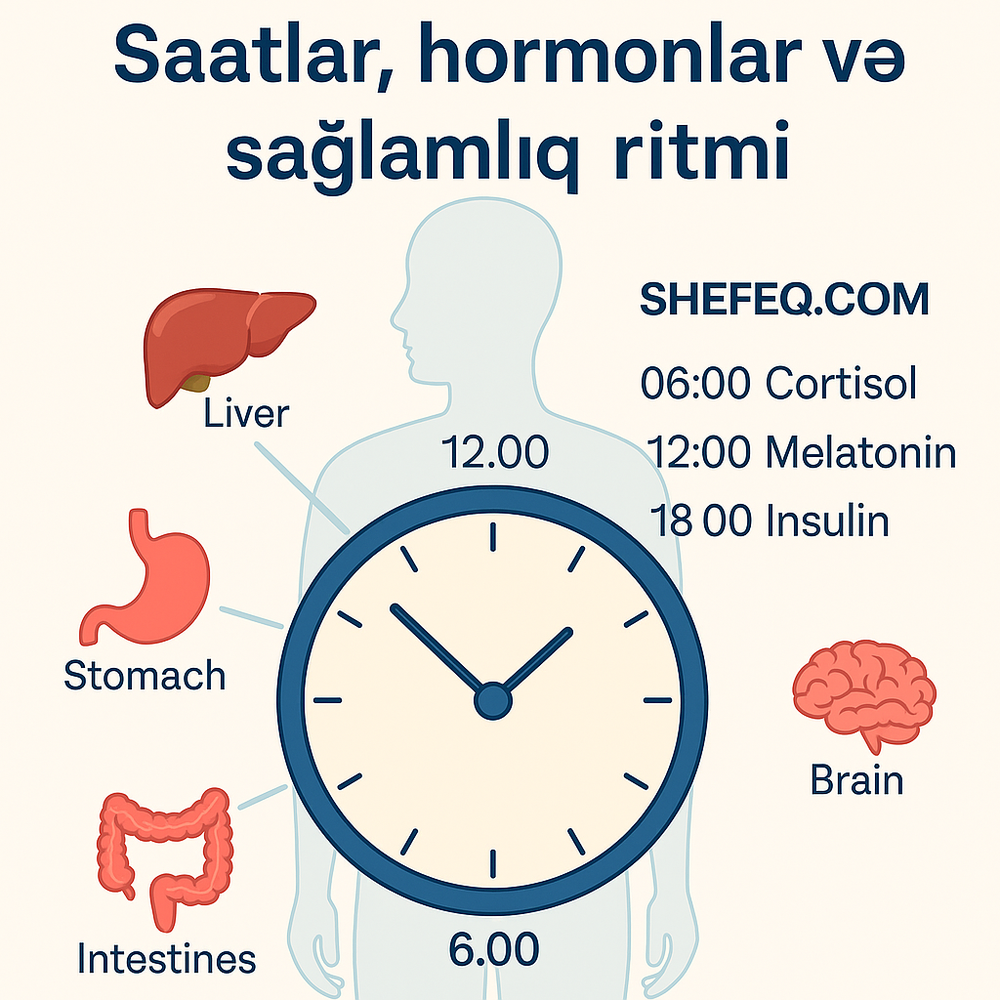Introduction
Our lives are tied to time. We wake up by the clock, eat by the clock, and go to work by the clock. But our bodies also have their own clocks. They operate with precise mechanisms and biological rhythms. Inside the human body, there is a clock that regulates hormones, determines the timing of organ activity, and holds the key to a healthy future. In this article, we will explore the concept of the “body clock,” hormone rhythms, the circadian clock, and healthy lifestyle principles aligned with time.
I. What Is the Biological Clock?
Our bodies are synchronized with nature. The 24-hour cycle is called the circadian rhythm. It regulates body temperature, blood pressure, hormone secretion, and sleep-wake cycles. This rhythm is controlled by the suprachiasmatic nucleus (SCN) located in the hypothalamus. The SCN detects daylight through the eyes and determines the timing for the release of hormones like melatonin and cortisol.
Circadian rhythms affect more than just sleep and wakefulness. They also regulate the immune system, metabolism, memory, emotional balance, and even skin regeneration. When this clock is disrupted, people often suffer from fatigue, insomnia, lack of concentration, and psychological difficulties.
II. Hormonal Rhythms – Unity with Time
1. Cortisol (stress hormone)
Cortisol peaks early in the morning (6:00–8:00 AM). At this time, a person wakes up and feels energetic. Cortisol is secreted by the adrenal glands and keeps the body alert. It also increases during stress. However, chronically high cortisol weakens the immune system and can lead to chronic fatigue syndrome.
2. Melatonin (sleep hormone)
Melatonin is secreted in darkness, increases after 9:00 PM, and peaks around 2:00 AM. Screen light suppresses melatonin production, leading to insomnia, attention disorders, and depression. In children and adolescents, timely melatonin secretion also supports the proper functioning of growth hormones.
3. Serotonin (happiness hormone)
Serotonin is secreted in daylight. Physical activity, social interaction, and nature walks help boost serotonin levels. A balanced serotonin level is crucial for mental health.
4. Insulin and Glucose Metabolism
Carbohydrate metabolism is more efficient in the morning. Eating sweets at night increases insulin resistance and leads to obesity. When the circadian rhythm is disrupted, the risk of diabetes rises significantly.
III. Organ Activity by the Clock (Natural Rhythms)
In ancient Eastern medicine, there is a 24-hour organ clock. Every 2 hours, a different organ is at peak activity. Modern science supports many of these ideas:
-
05:00 – 07:00 – Lungs: Best time for fresh air and deep breathing.
-
07:00 – 09:00 – Stomach: Breakfast time. Recommended to eat a rich but not heavy meal.
-
13:00 – 15:00 – Small Intestine: Peak time for nutrient absorption.
-
21:00 – 23:00 – Blood and energy restoration: Time to wind down and prepare for sleep.
-
23:00 – 01:00 – Liver: Detoxification processes are at their peak.
IV. How to Align Your Body Clock
-
Go to bed and wake up at the same time every day
-
Create a morning ritual: walk, meditate, drink water
-
Avoid caffeine after 1:00 PM
-
Keep dinner light
-
Stay away from screens at night
V. Effects of Living Against Your Internal Rhythm
-
Insomnia, depression, panic attacks
-
Hormonal disorders (diabetes, PCOS)
-
Thyroid issues
-
Weight gain and insulin resistance
-
Skin problems (acne, eczema)
VI. Living in Time – Mind-Body Harmony
Living in harmony with time means emotional balance, mental peace, and physical well-being. Following the circadian rhythm reduces stress, improves sleep, and strengthens the immune system. When a person listens to their internal clock, they move closer to true health.
Conclusion
Inside our bodies, there is a clock. Sometimes it whispers, sometimes it shouts. Understanding it and living in tune with it is the simplest yet deepest path to health. Let’s listen to the clock — the body is speaking to us.
What do you think?
-
In your opinion, what problems can arise from a disrupted body clock?
-
What do you do to maintain your daily rhythm?
-
Do you have a time-based routine for sleep, eating, or exercise?
-
At what time of day do you feel the most energetic?
Share your thoughts with us. Maybe your words will help awaken someone else’s inner clock!

